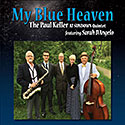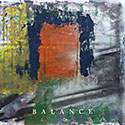Recent Recordings by Area Jazz Artists
The latest batch of recordings available for review provides a vivid reminder of the vitality of the local jazz scene, comprising releases from artists of various generations working in a variety of stylistic areas.
To begin with swing to modern jazz music, we have Paul Keller’s AT SUNDOWN Quintet, featuring Sarah D’Angelo, playing on My Blue Heaven (PKO 074). The band consists of the leader, who also wrote all the arrangements, on bass with Sarah D’Angelo (voice, clarinet), Steve Wood (tenor saxophone, flute), Duncan McMillan (piano), Stephen Boegehold (drums), with “special (family) guests” Mark D’Angelo (congas, bongos, shaker, wind chimes), and Leah Keller (bell).
playing on My Blue Heaven (PKO 074). The band consists of the leader, who also wrote all the arrangements, on bass with Sarah D’Angelo (voice, clarinet), Steve Wood (tenor saxophone, flute), Duncan McMillan (piano), Stephen Boegehold (drums), with “special (family) guests” Mark D’Angelo (congas, bongos, shaker, wind chimes), and Leah Keller (bell).
This is a full recital, with no less than seventeen songs, including a couple of originals by Keller and D’Angelo, most of them rarely played. The repertoire contributes to the success of the album; except for the title song and “Blue Skies,” few of these tunes have been played to death. While the recital is clearly organized to feature D’Angelo’s ringing vocals, this is balanced by well-stated improvisations by all involved. Keller’s tight arrangements exploit d’Angelo’s clarinet (or singing) voiced with Wood’s tenor sax and flute in a manner that sometimes gives the impression of a larger group. The tunes are short, forcing McMillan and Wood to make compact statements, which they do with appropriate imaginative force; it is particularly interesting to hear Wood solo so well on the flute.
Another well-known vocalist is featured on a very different release, Sheila Landis & Rick Matle: Beautiful Things  (SheLan Records SL024). Landis, accompanied only by electric guitarist Matle, takes on a very different repertoire in a much more intimate setting. Landis sings a wide range of tunes, from blues to bossa nova and a repertoire of familiar songs such as “Pennies from Heaven” or “Caravan.”
(SheLan Records SL024). Landis, accompanied only by electric guitarist Matle, takes on a very different repertoire in a much more intimate setting. Landis sings a wide range of tunes, from blues to bossa nova and a repertoire of familiar songs such as “Pennies from Heaven” or “Caravan.”
Even though the material was recorded at various performances around Detroit, it was all chosen and arranged in a manner suggesting a coherent recital that shines light on the versatility of both performers. Apparently, some of it comes from tributes to Ella Fitzgerald, but the influence is, quite fortunately, more in spirit than in substance. Although Landis scats on occasion, she never really imitates the great singer, and while the liner notes mention Ella’s duets with Joe Pass, Matle has a way with the guitar that is all his own. Landis also pays tribute more directly to other singers, most notably to Annie Ross on “In A Mellow Tone.”
These two artists have developed an original approach to music honed by years of playing together that is very well represented on this CD.
Tenor saxophonist Ben Jansson grew up in Ann Arbor and became a major player on the local scene, playing and recording often with Paul Keller and many others. He moved to Sapporo in Japan a few years ago, but comes back to visit and perform on an annual basis. Just recently, he played at KCH and made his most recent recording available, This is Live at D-Bop (BMJ 002),  on which he is accompanied by Yanagi Masaya (bass), Tatsuru Naganuma (el. guitar) and Hiroki Itou (drums).
on which he is accompanied by Yanagi Masaya (bass), Tatsuru Naganuma (el. guitar) and Hiroki Itou (drums).
This is swinging music that hits you from the first note, with an excitement that can only be found in recordings made at performances rather than in the studio. The rhythm section swings hard and Naganuma as well as Masaya are impressive soloists who get plenty of space in the quartet.
Jansson has always impressed with his wonderful saxophone technique and deep knowledge of the jazz tradition. Over the years his sound has hardened and he seems to push more, obviating the idea that one is supposed slow down with age. He has perfected his own way of playing that takes us back to the time before Coltrane and his contemporaries changed tenor saxophone playing, with a style based more on the Lester Young inspired playing of musicians such as Al Cohn and Zoot Sims. Rather than investigate harmonic complexities, he is an old-fashioned story teller, who weaves endless melodies.
This one may be hard to find, so try to pick one up the next time Jansson comes to town.
Bassist Rob Crozier has just released Tall Trees;  his quintet consists of the leader on basses, thumb piano, didgeridoo, percussion, with Pete Kahn (alto sax, clarinet), Rodney Rich (guitar), Brian Brill (piano, keyboards), Sam Genson (drums), and Kelly McDermott (flute on one track).
his quintet consists of the leader on basses, thumb piano, didgeridoo, percussion, with Pete Kahn (alto sax, clarinet), Rodney Rich (guitar), Brian Brill (piano, keyboards), Sam Genson (drums), and Kelly McDermott (flute on one track).
With two exceptions, all the compositions were written by Crozier, who also supplied the arrangements. The tunes cover a broad range of styles with different rhythms, from swing to funk, providing quite a bit of variety to the proceedings, but there is also a specific timbral and expressive unity to the album. “Fukishima Blues” is an atmospheric piano trio, and “Flute Piece” is a ballad featuring McDermott, but mostly one hears the full quintet.
Throughout, it is a treat to hear Pete Kahn’s alto saxophone and clarinet, although I, for one, wish that they had not approached Duke Ellington’s magisterial “Isfahan” as an up-tempo number. This is a small quibble, however, for otherwise Tall Trees is an undoubted success.
Saxophonist Marcus Elliot and pianist Michael Malis stand out among the younger musicians who are contributing to the current renaissance of jazz in Detroit; as a duo, they have just released a recital of their own compositions on Balance.
 Elliot and Malis have crafted a unique album that seems to be a suite, with an impressive unity of purpose: the compositions seem created only for them and one cannot imagine them performed by anyone else, linked as they are to the sounds and personalities of the duo. Duets of this kind often seem like afterthoughts when half a quartet got lost in a snow storm, but not in this case.
Elliot and Malis have crafted a unique album that seems to be a suite, with an impressive unity of purpose: the compositions seem created only for them and one cannot imagine them performed by anyone else, linked as they are to the sounds and personalities of the duo. Duets of this kind often seem like afterthoughts when half a quartet got lost in a snow storm, but not in this case.
The mood is often pensive and the musicians take their time, exploring not just pitches, but the sonorities of their instruments, exploiting their full ranges, from top to bottom. Sometimes they play in perfect unison, elsewhere they chase each other, sometimes the accent is on harmony, and then melodicism takes over. Malis has his own touch on the piano and a seemingly unending repertoire of voicings and ways of attacking the keys while Elliot’s emotionally charged saxophone playing reveals an enviable technical mastery. He is well recognized for his tenor playing, but his outings on soprano on “Raw Mastery” and “Feels” demonstrate that he has developed his own sound and concept on the smaller horn.
Balance is full of musical achievements that only become apparent upon repeated listening.
For four years Elliot’s quartet held a weekly gig at Cliff Bell’s jazz club in Detroit. Although that run is over, he has released a recording of the group on Sonic Refuge.  The lineup is Marcus Elliot (tenor saxophone), Michael Malis (piano), Ben Rolston (bass), and Stephen Boegehold (drums). Three of the five compositions are by Elliot, with one each from Malis and Rolston (who contributes the most complex tune, “Are we Children Yet?,” with a lovely solo by the composer).
The lineup is Marcus Elliot (tenor saxophone), Michael Malis (piano), Ben Rolston (bass), and Stephen Boegehold (drums). Three of the five compositions are by Elliot, with one each from Malis and Rolston (who contributes the most complex tune, “Are we Children Yet?,” with a lovely solo by the composer).
As can be expected, the music on this recording is quite different from that found on Balance, with the drummer and bassist playing the roles of equal partners in the group and the years of playing together are well on offer here, manifest in the nuanced interactions between the members of the quartet. The music is spirited and ardent but no matter how complex the rhythms, it always swings, sometimes with exuberance, at other times with controlled passion.
This is a wonderful testament of a group that had a great run and is now only otherwise a memory, with Rolston and Boegehold having recently relocated to Brooklyn.